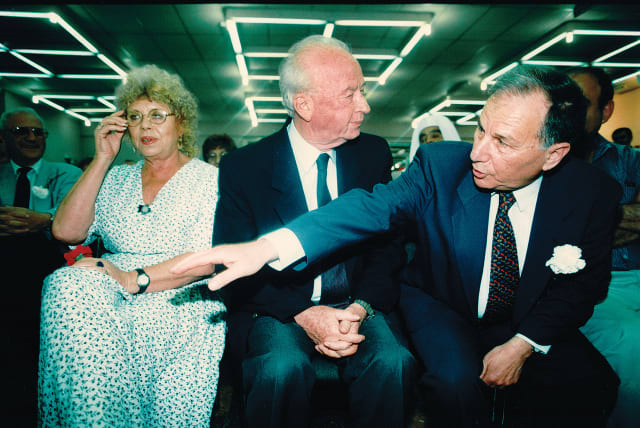An ode to Amnon Rubenstein: The best politician Israel ever had

MIDDLE ISRAEL: Amnon Rubinstein passed away while Israel grapples with the worst crisis in its history; and craves a new political dawn that will replace a departing era’s surplus of divisive leaders
Amnon Rubinstein, who died last week at 92, was a paragon of all the vision, impact, modesty, and compassion that Israel’s postwar restoration will demand.
Derided since antiquity as shallow, selfish, dishonest, ignorant, and narrow-minded, politicians are history’s most stereotyped lot.
Our lawmakers all too frequently justify quips like: “I was too honest to be a politician” (Socrates), or “Politicians pretend to be more stupid than nature made them” (Bertrand Russel), or “Politicians are like diapers, they should change frequently and for the same reason” (Mark Twain).
Entertaining though they are, such generalizations are neither fair nor true. Fair they are not because they are made by people who did not themselves hold public office, and thus never faced the kind of tests they expect politicians to pass. And true they are not because some politicians actually defy all such stereotypes.
One of them was Prof. Amnon Rubinstein who died last week at 92 after an illustrious academic career that included a political sub-career; a sub-career of 25 years that produced Israeli history’s most effective politician – a rare blending of vision, knowledge, pragmatism, modesty, and drive, a combination that should serve as a model for the kind of politician Israel’s postwar restoration will demand.
A prodigy who at age 32 established Tel Aviv University’s law school, Rubinstein entered politics unwittingly, as a reaction to the Yom Kippur War.
Running with the centrist Dash party, which won 15 seats in 1977, Rubinstein did not follow his colleagues when they entered Menachem Begin’s government, arguing that his coalition would not work toward realizing Rubinstein’s goals. It was a debatable choice, but it unveiled Rubinstein’s idea of public office: doing was everything, power was nothing.
Recognized already then as a leading jurist, Rubinstein didn’t need political titles to be somebody, unlike our current Knesset’s many lowlifes.
It therefore took seven years until Rubinstein became a minister, in 1984. Heading a faction of only three, he joined the Peres-Shamir coalition and took what seemed like the most marginal ministry on offer – communications – not because he couldn’t demand something more prestigious, but because he had in mind reforms he knew he could pass.
Actions as a minister in office
A believing capitalist, Rubinstein thus took one of socialist Israel’s most notorious creations – the state-owned telephone monopoly – and launched its privatization process by turning that bureaucracy into a company. In due course, Israel got the modern, competitive, and affordable telephone industry that we now take for granted.
Rubinstein then turned to deregulating and privatizing the broadcast industry, igniting the process that produced the plethora of radio and TV channels that succeeded what, until Rubinstein’s arrival, was a state-owned monopoly.
This record alone was more than most politicians in any country ever did in their entire lives. But the following decade it was eclipsed by Rubinstein’s delivery as education minister.
Rubinstein’s very arrival in what is generally considered a thankless office was telling in itself. Having joined Yitzhak Rabin’s government as energy minister, he was asked to switch to education because its minister, the crusading secularist Shulamit Aloni, used her position to attack religious Jews who deny evolution. Shas’s rabbis were offended, and made Rabin remove her.
Rubinstein was no less secular than Aloni, but such bickering was not what he came to do, and also was not his style. Instead, Rubinstein targeted a goal that was consensual, feasible, and urgent: opening up higher education.
With university education offered at the time by only eight universities, Rubinstein deregulated that system and made it simple and easy to open colleges throughout the country. Within seven years there were 42 new colleges offering degrees in anything and everything from engineering, accounting, and programming, to psychology, business, and law.
The number of Israelis pursuing academic studies soared, from 20,000 in 1990 to 30,000 a decade later, and more than 50,000 today, most of whom have no idea it was Amnon Rubinstein who broke higher education’s barriers by leading it to the social and geographic periphery.
The common denominator between his economic and educational revolutions was not just Rubinstein’s reformist spirit and liberal conviction, but the tactics of a political judoka who achieved maximum impact with minimum force. The place where this was most astonishing was in the realm of his academic expertise, constitutional law.
Following the Shamir-Peres government’s dissolution in 1990, Rubinstein was in the weakest position a lawmaker can be in: an opposition representative in the Knesset Law Committee. Even so, Rubinstein harnessed from that non-position both the government and the opposition to jointly pass in 1993 Basic Law: Human Dignity and Liberty, clearly the most important constitutional legislation in Israel’s history.
Added up, Rubinstein’s economic, educational, and legislative imprint on the Jewish state was matched by no one, not even arch-politicians David Ben-Gurion, Menachem Begin, and Shimon Peres, none of whom delivered so much, so lastingly, with such minimal power.
On top of this, Rubinstein was also modest. Though he had so much political delivery to brag about, he never did, and though he was an Israel Prize laureate who published 17 books (and also six novels) he was humble enough to publicly concede mistakes, most notably his conclusion that on the road to the Oslo Accords, which he supported, the Palestinians misled Israel.
Amnon Rubinstein – a patriot who fought in Israel’s wars as an artillery officer – passed away while Israel grapples with the worst crisis in its history, and craves a new political dawn; a dawn that will replace a departing era’s surplus of empty, divisive, and sloganeering braggarts with modest, visionary, thinking, and reconciling leaders; leaders like Amnon Rubinstein; leaders who will say not “I” but “we,” ask not “what should I say” but “what should I do,” and think not of their sector, class, or tribe, but of their country, society, nation, and ever-fragile Jewish state.
www.MiddleIsrael.net
The writer, a Hartman Institute fellow, is the author of the bestselling Mitzad Ha’ivelet Ha’yehudi (The Jewish March of Folly, Yediot Sefarim, 2019), a revisionist history of the Jewish people’s political leadership.
Jerusalem Post Store
`; document.getElementById("linkPremium").innerHTML = cont; var divWithLink = document.getElementById("premium-link"); if (divWithLink !== null && divWithLink !== 'undefined') { divWithLink.style.border = "solid 1px #cb0f3e"; divWithLink.style.textAlign = "center"; divWithLink.style.marginBottom = "15px"; divWithLink.style.marginTop = "15px"; divWithLink.style.width = "100%"; divWithLink.style.backgroundColor = "#122952"; divWithLink.style.color = "#ffffff"; divWithLink.style.lineHeight = "1.5"; } } (function (v, i) { });

